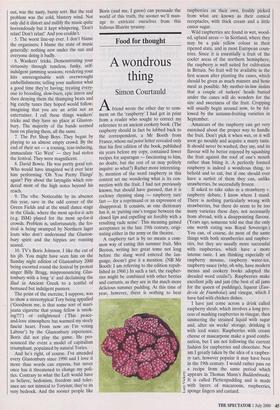Food for thought
A wondrous thing
Simon Courtauld
Afriend wrote the other day to com- ment on the 'raspberry' I had got in print from a reader who sought to correct my reference to an ancient cookery book. (The raspberry should in fact be lobbed back to the correspondent, a Mr Booth from France, whose nul point letter revealed only that his first edition of the book, published six years before my copy, contained fewer recipes for asparagus — fascinating to him, no doubt, but the rest of us may politely inquire: so what?) Rather more interesting- ly, mention of the word raspberry in this context set me wondering what is its con- nection with the fruit. I had not previously known, but should have guessed, that it is cockney rhyming slang — raspberry tart/ fart — for a reprimand or an expression of disapproval. It consists, as one dictionary has it, in 'putting one's tongue between the closed lips and expelling air forcibly with a resulting rude noise'. This meaning gained acceptance in the late 19th century, origi- nating either in the army or the theatre.
A raspberry tart is by no means a com- mon way of eating this summer fruit. Mrs Beeton, writing her great tome not long before the slang word entered the lan- guage, doesn't give it a mention. (NB Mr Booth: I am referring to the edition repub- lished in 1960.) In such a tart, the raspber- ries might be combined with other berries and currants, as they are in the much more delicious summer pudding. At this time of year, however, there is nothing to beat raspberries on their own, freshly picked from what are known as their conical receptacles, with thick cream and a little castor sugar.
Wild raspberries are found in wet, wood- ed, upland areas — in Scotland, where they may be a pale yellow colour in their ripened state, and in most European coun- tries. Since it is essentially a fruit of the cooler areas of the northern hemisphere, the raspberry is well suited for cultivation in Britain. No fruit will be available in the first season after planting the canes, which should be given as much manure and bone meal as possible. My mother-in-law insists that a couple of turkeys' heads buried under the canes will do wonders for the size and sweetness of the fruit. Cropping will usually begin around now, to be fol- lowed by the autumn-fruiting varieties in September.
Amateurs of the raspberry can get very exercised about the proper way to handle the fruit. Don't pick it when wet, or it will soon go mouldy and acquire a musty taste. It should never be washed, they say, and its flavour will be better enjoyed by squashing the fruit against the roof of one's mouth rather than biting it. A perfectly formed raspberry is indeed a wondrous thing, to behold and to eat, but if one should ever have a surfeit of them they can, unlike strawberries, be successfully frozen.
If asked to take sides in a strawberry v. raspberry debate, I know where I stand. There is nothing particularly wrong with strawberries, but there do seem to be too many varieties these days, not necessarily from abroad, with a disappointing flavour. (Years ago, someone told me that the only one worth eating was Royal Sovereign.) You can, of course, do most of the same things with both strawberries and raspber- ries, but they are usually more successful with raspberries, which have a more intense taste. I am thinking especially of raspberry mousse, raspberry water-ice, raspberry sauce (why, oh why, have modern menus and cookery books adopted the dreaded word coulis?). Raspberries make excellent jelly and jam (the best of all jams for the queen of puddings), liqueur (Eau- de-vie de Framboise) and vinegar, which I have had with chicken dishes.
I have just come across a drink called raspberry shrub, which involves a long pro- cess of mashing raspberries in vinegar, then simmering the strained liquid with sugar and, after six weeks' storage, drinking it with iced water. Raspberries with cream cheese or mascarpone make a good combi- nation, but I am not following the current fashion for raspberries and chocolate. Nor am I greatly taken by the idea of a raspber- ry tart, however popular it may have been in the 19th century. I would rather pass on a recipe from the same period which appears in Thomas Mann's Buddenbrooks. It is called Plettenpudding and is made with layers of macaroons, raspberries, sponge fingers and custard.


























































 Previous page
Previous page